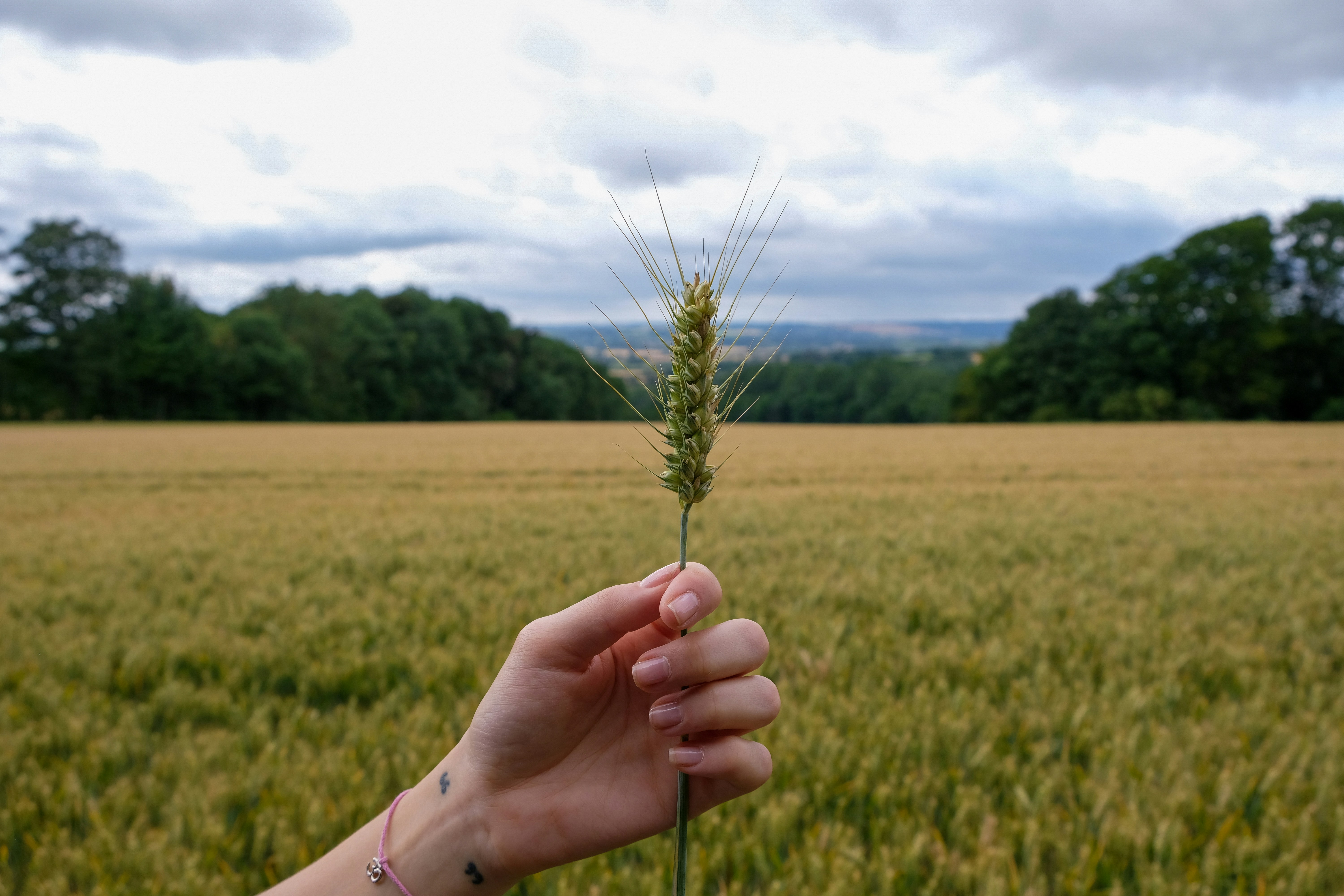Some of you know I get to participate in an international Bible Study zoom call most weeks led by brother Rog. This year we have been focused on what Rog calls “God’s Economic Plan” for the children of Israel as it is laid out partially in Leviticus 25.
I don’t know exactly how it happened, but in last week’s installment I mentioned the Old Testament book of Ruth one too many times, and Rog ended by annoucing to the group that next week (this week now) I (Rob) would be leading a discussion on the economic implications of the book of Ruth.
So… in advance of that, I thought I would think it out live in the blog this week. Here we go with Ruth 1 from The MESSAGE version of the Old Testament:
Once upon a time—it was back in the days when judges led Israel—there was a famine in the land. A man from Bethlehem in Judah left home to live in the country of Moab, he and his wife and his two sons. The man’s name was Elimelech; his wife’s name was Naomi; his sons were named Mahlon and Kilion—all Ephrathites from Bethlehem in Judah. They all went to the country of Moab and settled there.
Elimelech died and Naomi was left, she and her two sons. The sons took Moabite wives; the name of the first was Orpah, the second Ruth. They lived there in Moab for the next ten years. But then the two brothers, Mahlon and Kilion, died. Now the woman was left without either her young men or her husband.
* * *
One day she got herself together, she and her two daughters-in-law, to leave the country of Moab and set out for home; she had heard that God had been pleased to visit his people and give them food. And so she started out from the place she had been living, she and her two daughters-in-law with her, on the road back to the land of Judah.
After a short while on the road, Naomi told her two daughters-in-law, “Go back. Go home and live with your mothers. And may God treat you as graciously as you treated your deceased husbands and me. May God give each of you a new home and a new husband!” She kissed them and they cried openly.
They said, “No, we’re going on with you to your people.”
But Naomi was firm: “Go back, my dear daughters. Why would you come with me? Do you suppose I still have sons in my womb who can become your future husbands? Go back, dear daughters—on your way, please! I’m too old to get a husband. Why, even if I said, ‘There’s still hope!’ and this very night got a man and had sons, can you imagine being satisfied to wait until they were grown? Would you wait that long to get married again? No, dear daughters; this is a bitter pill for me to swallow—more bitter for me than for you. God has dealt me a hard blow.”
Again they cried openly. Orpah kissed her mother-in-law good-bye; but Ruth embraced her and held on.
Naomi said, “Look, your sister-in-law is going back home to live with her own people and gods; go with her.”
But Ruth said, “Don’t force me to leave you; don’t make me go home. Where you go, I go; and where you live, I’ll live. Your people are my people, your God is my god; where you die, I’ll die, and that’s where I’ll be buried, so help me God—not even death itself is going to come between us!”
When Naomi saw that Ruth had her heart set on going with her, she gave in. And so the two of them traveled on together to Bethlehem.
When they arrived in Bethlehem the whole town was soon buzzing: “Is this really our Naomi? And after all this time!”
But she said, “Don’t call me Naomi; call me Bitter. The Strong One has dealt me a bitter blow. I left here full of life, and God has brought me back with nothing but the clothes on my back. Why would you call me Naomi? God certainly doesn’t. The Strong One ruined me.”
And so Naomi was back, and Ruth the foreigner with her, back from the country of Moab. They arrived in Bethlehem at the beginning of the barley harvest.
This is typically taught in sort of a romanticized way as a story about RELATIONSHIP. Ruth is a herione of sorts, who is ultimately rescued (redeemed) herself. As you can imagine, I have TONS of questions (mostly unanswered, and maybe even unanswerable in this life) about this four chapter Old Testament work. If you want to get deeper with me on this book, I am available for lunches, dinners or phone calls…
But for this week, I am going to try to restrict my probing to ECONOMIC and GRIEF related texts.
There was a famine in the land.
I and most of my American readers have NO concept of what that would be like. In an ancient world where food comes from the ground to the table with zero stops between, NO food coming from the ground means NO food on the table.
Now back in Leviticus, the God of the Old Testament Israelites had COMMANDED them to take care of one another. He had given instructions, like in Leviticus 25, which, if followed, may well have kept this family from moving 50 miles east to the region called Moab. But the extended family of our initial cast of characters had apparently NOT done this well, as it would seem to me this little family of 4 – Elimelech, Naomi (husband and wife) and it would appear 2 young teenage boys, Mahlon and Kilion – moved 50 miles east because there was food there that wasn’t available at their home.
The little family lived in Moab the next ten years. The family of four became a family of three when Elimelech died, beginning Naomi’s GRIEF RECOVERY path. I suggest the boys were maybe young teenagers when they left because they got married in Moab. For a time, the family of three became a family of five. But not long enough for any children to be born to the younger generation before BOTH of the sons also died. And it became a family of three. And Naomi was BROKEN.
“One day she got herself together…”
That is actually saying something for a woman who had lost her husband AND her two sons. I want to think the loss of the husband was a little less emotional. Back in this era, marriage was likely more of a BUSINESS relationship than the result of two people falling in love. So the husband dies, but Naomi still had her boys and enough ECONOMIC LEVERAGE to acquire wives for them. But when the two sons die, she was BROKEN.
I would say I have no idea what this may have been like, but then, if any of you know my story, you know that is only partly true. My own wife lost her only son almost 11 months ago, and her grief has been undeniable. So I have some idea where she might have been when the story says “she got herself together.”
Why the decision to move back west? “She had heard that GOD had been pleased to visit his people and give them food.“
In Moab there was only grief. And even if there was FOOD available, the three women would have likely struggled to find their place in the food chain. If there was FOOD available back home, maybe the extended family there could be counted on THIS TIME.
But there was the issue of the two young Moabite women. I have to believe there were some emotional and ethnic concerns behind the discussion around staying or going, but I also have to believe a significant part of the decision of the younger two was around FOOD SECURITY.
Did Orpah (the one that stayed) decide to stay behind simply because she wasn’t as emotionally connected to Naomi? They were both very emotional, per the story. Neither seemed to really want to leave her. I think maybe Orpah had better options – as regards FOOD SECURITY – if she remained in Moab than did Ruth (the one that decided to follow Naomi back to Bethlehem).
Again, this is an ancient story, so we can’t know the mind of the author, but in my imagination Ruth surely had less to stay for. Maybe her family was poor or had died. Maybe they had a bigger issue with the inter-ethnic marriage they had agreed to than did Orpah’s and it simply wasn’t safe to return home.
I think Ruth simply decided she had a better chance of SURVIVAL – because isn’t that really what we are talking about when the concept of FOOD SECURITY is in play – if she followed Naomi back to Bethlehem. At least Naomi had heard there was food there.
Meanwhile, Naomi is wondering how Ruth will fit in back home. What will people think? Does she really have a chance for a better life there? And with her?
Two more thoughts: one related to GRIEF RECOVERY and one related to FOOD SECURITY…
First of all, many of the stories in the Jewish Bible (another name for the Old Testament) are written such that the NAMES of the characters give a hint as to the role they play in the story. In this story, Elimelech has a name that meant “God is King” in the old Hebrew – maybe a character named simply to invoke that assertion into the story. Mahlon and Kilion (the two sons) both have names that meant in old Hebrew something like “sickness” or “wasting away.” As the chapter ends, we find Naomi (which in old Hebrew means something like “my joy”) returning home and asking her family to no longer call her “my joy”, but rather, “Mara” – which The MESSAGE simply translates directly to it’s meaning: BITTER. In other words, Naomi may have “gotten herself together,” but she was still broken. She was home. But she was still GRIEVING. Enough for her to make that the ONLY conversation of which we are aware between Naomi and those to whom she returned.
Finally, do we think it is coincidence that our story has them arriving “at the beginning of the barley harvest?” Besides the fact that the harvest plays a HUGE part in the rest of the story, as we will see moving forward, I assert once again that one of the most significant themes of the story is FOOD SECURITY.
In the rest of the story we will learn just a little bit about “God’s Economic Plan” as regards caring for the poor among us.








